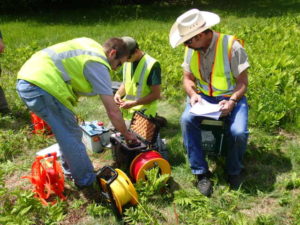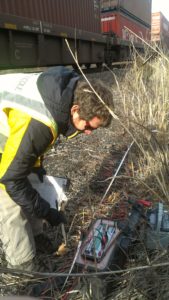Geophysics and Geophysical Engineering Services
The S.W.COLE team provides geophysical services in support of our geotechnical engineering and construction services.
Vibration and Blast Monitoring Services
In New England, construction activities often involve blasting or hammering for bedrock removal to prepare a site for construction or vibratory compaction as part of the site preparation. These activities are often performed in close proximity to existing structures, which may be damaged if the work is performed outside approved parameters. We perform both preblast surveys (incorporating high resolution digital photographs and video to document site conditions prior to construction operations) and vibration and blast monitoring (using seismographs to measure the vibrations and conformity to approved construction specifications).
Electrical Resistivity Testing

Resistivity Testing in Maine
Resistivity testing has a wide variety of applications, including geotechnical interpretation and construction applications. Soil (or rock) electrical resistivity is a measure of how much a material resists the flow of electricity. We measure resistivity using the following methods:
- Wenner Array Field Testing, performed in accordance with IEEE or ASTM procedures, which requires an electrical current to be induced into the material through electrodes. The electrical potential (voltage) is then measured at other electrodes placed at known distances.
- Laboratory Resistivity Testing. Common applications include grounding “touch stone” testing, a specialty method developed to evaluate the “touch stone” placed around wind towers and on substation sites, and soil box (“Miller Box”) resistivity, which is used to evaluate the corrosion of ductile iron pipe or galvanized culverts.
Thermal Resistance and Conductivity Testing

Resistivity Testing
The thermal resistance and conductivity testing performed by S.W.COLE may be performed in a materials laboratory or on a job site, depending on the instrument and the desired data. The testing is used to measure the thermal resistance or conductance of a material, which will vary based on the desired application.
Concrete Surface Resistivity Testing
Construction projects such as roads, bridges, dams, piers, parking garages or retaining walls contain concrete mixtures that are often placed in environments with a high salt or chloride exposure. This exposure can potentially develop corrosion of the embedded reinforcing steel, which can potentially compromise the structure.
Concrete surface resistivity testing is used to determine potential chloride ion permeability (or penetration) of hardened concrete.
The surface resistivity test performed by S.W.COLE is a non-destructive method of measuring concrete resistivity using a small hand-held electrical device that takes minutes to perform. The test can be performed on cast test cylinders or on in-place structures.

